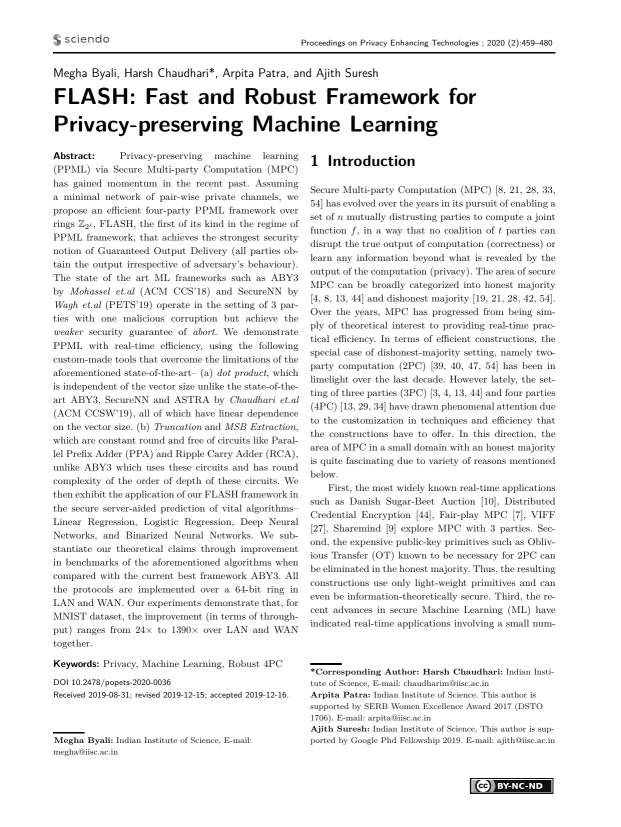FLASH: Fast and Robust Framework for Privacy-preserving Machine Learning
Authors: Megha Byali (Indian Institute of Science), Harsh Chaudhari (Indian Institute of Science), Arpita Patra (Indian Institute of Science. This author is supported by SERB Women Excellence Award 2017 (DSTO 1706).), Ajith Suresh (Indian Institute of Science, This author is supported by Google Phd Fellowship 2019.)
Volume: 2020
Issue: 2
Pages: 459–480
DOI: https://doi.org/10.2478/popets-2020-0036
Abstract: Privacy-preserving machine learning (PPML) via Secure Multi-party Computation (MPC) has gained momentum in the recent past. Assuming a minimal network of pair-wise private channels, we propose an efficient four-party PPML framework over rings Z2` , FLASH, the first of its kind in the regime of PPML framework, that achieves the strongest security notion of Guaranteed Output Delivery (all parties obtain the output irrespective of adversary’s behaviour). The state of the art ML frameworks such as ABY3 by Mohassel et.al (ACM CCS’18) and SecureNN by Wagh et.al (PETS’19) operate in the setting of 3 parties with one malicious corruption but achieve the weaker security guarantee of abort. We demonstrate PPML with real-time efficiency, using the following custom-made tools that overcome the limitations of the aforementioned state-of-the-art– (a) dot product, which is independent of the vector size unlike the state-of-theart ABY3, SecureNN and ASTRA by Chaudhari et.al (ACM CCSW’19), all of which have linear dependence on the vector size. (b) Truncation and MSB Extraction, which are constant round and free of circuits like Parallel Prefix Adder (PPA) and Ripple Carry Adder (RCA), unlike ABY3 which uses these circuits and has round complexity of the order of depth of these circuits. We then exhibit the application of our FLASH framework in the secure server-aided prediction of vital algorithms– Linear Regression, Logistic Regression, Deep Neural Networks, and Binarized Neural Networks. We substantiate our theoretical claims through improvement in benchmarks of the aforementioned algorithms when compared with the current best framework ABY3. All the protocols are implemented over a 64-bit ring in LAN and WAN. Our experiments demonstrate that, for MNIST dataset, the improvement (in terms of throughput) ranges from 24× to 1390× over LAN and WAN together.
Keywords: Privacy, Machine Learning, Robust 4PC
Copyright in PoPETs articles are held by their authors. This article is published under a Creative Commons Attribution-NonCommercial-NoDerivs 3.0 license.

